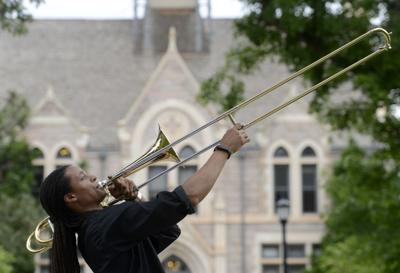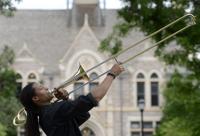In another attempt to target students who might not be thinking of applying to the pricy, private liberal arts school, Colorado College is looking for 25 Pikes Peak region high school freshmen who have what Jordan Travis Radke calls “high promise.”
Ideal candidates for a new college-prep program Colorado College is launching for southern Colorado possess “untapped potential,” which doesn’t necessarily mean high achievers, said Radke, director of the Collaborative for Community Engagement at Colorado College.
Eligible students will come from groups traditionally underrepresented on college campuses, including low-income students, first-generation students and students of color.
The application period for the new Stroud Scholars program opens Nov. 15 and continues through Feb. 15. The program begins for rising high school sophomores in July.
Those selected will receive pre-collegiate resources and support throughout their high school career.
Participants will live on campus for three weeks each of the following three summers and take college-readiness courses taught by Colorado College professors on composition, writing and quantitative reasoning skills.
Critical-inquiry sessions led by Colorado College students will be offered in the afternoons.
During the school year, participants will be paired with student mentors and attend a workshop series for youth and parents to navigate the college admissions process, regardless of where they want to apply.
The Stroud Scholars program, named after two of Colorado College’s earliest African-American graduates, has two main goals, Radke said.
The first is to support participants’ educational trajectory to successfully transition into college, and the second is to provide “a real and accessible pathway into Colorado College,” Radke said.
Students successfully completing the program will earn admission to Colorado College after high school graduation and receive a comprehensive financial aid package to attend, according to officials.
Admittedly, the school is not a good fit for everyone, Radke said, in which case participants will receive assistance in applying to other colleges and universities.
“We hope to help students successfully transition into college and be academically and socially prepared to thrive and have a successful experience once in college,” she said.
Twenty-five additional students will be accepted as Stroud Scholars in 2021 and 2022 for three-year terms.
“We also hope to increase collaboration and engagement with Colorado Springs and Pikes Peak region, strengthening our commitment as an anchor institution in this community,” Radke said.
Funding for the program is part of Colorado College’s campaign goal to raise $100 million for college access goals, primarily in the form of financial aid.
Increasing college access is a top priority of the school’s master plan, Radke said, by finding ways to lower barriers to admissions and ensuring accessibility to students from low- and middle-income families.
“Many alumni have contributed with amounts both large and small; it all adds up,” Radke said. “We are confident in our ability to support the program moving forward.”
In August, Colorado College announced an experimental tuition scholarship program targeting prospective in-state students from low-income to middle-class families. Under The Colorado Pledge, incoming freshmen in the fall of 2020 whose parents who show an adjusted gross income of less than $60,000 won’t pay anything for tuition, room and board, which tops $71,000 this academic year. Prospective students from families earning less than $125,000 annually would receive free tuition but not room and board.






 Your Privacy Choices
Your Privacy Choices